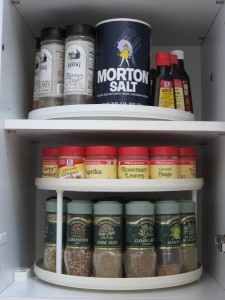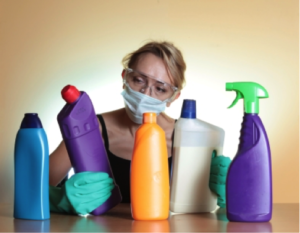 It’s a new year. You want to be your best self. Get organized. Lose weight. Exercise. These are some of the most popular resolutions (goals) year after year. Here’s a reality check: They are all great ideas but they are NOT goals.
It’s a new year. You want to be your best self. Get organized. Lose weight. Exercise. These are some of the most popular resolutions (goals) year after year. Here’s a reality check: They are all great ideas but they are NOT goals.
Why? Because they are too vague. How can you know if you’ve achieved them? What do you want to organize? How much weight do you want to lose? Do what for exercise? What’s the timeframe?
To be successful, remember this SMART acronym when creating goals.
S – Specific: Who, what, when, where, why
M – Measurable: Track progress and outcome
A – Achievable: Able to be accomplished
R – Realistic: Goal and timeframe work for you
T – Time-bound: Timeframe to start and, if applicable, end
Here are examples of SMART goals.
See the difference? On February 1st, if the bedroom is organized, you’ve lost five pounds or you’ve been walking two miles, four times a week, you’ve accomplished your goal! Conversely, if you haven’t met your goal, don’t give up. Just start anew.
Write down your goals. Schedule blocks of time in your calendar to work on them and honor those appointments as you would if they were with someone else. Close your eyes and imagine achieving your goal. Give yourself little rewards along the way.
Most important is motivation. Without it, you’re unlikely to succeed. If you’re not motivated on your own to organize your bedroom and it’s something you really want to do, find a photo of your dream bedroom and post it so you can see it every day. Think about how it would feel to actually live in this room. If you need help, ask a friend, family member, or professional organizer.
Have an organized 2016!
 When I read this headline, I had to smile: The Green Pope: Francis is putting the full weight of the papacy behind efforts to curb climate change. Many Professional Organizers base their businesses on being ‘green,’ recycling, and simplifying the homes and lives their clients lead. After being glued to the television for the Pope’s entire visit to the United States (I was painting my bedroom at the same time), I couldn’t help but see a connection between this incredible man and some of the same ideals that relate to the environment and the business of professional organizing. After the Pope’s visit, I did some research, and two documents written by the Pope stood out.
When I read this headline, I had to smile: The Green Pope: Francis is putting the full weight of the papacy behind efforts to curb climate change. Many Professional Organizers base their businesses on being ‘green,’ recycling, and simplifying the homes and lives their clients lead. After being glued to the television for the Pope’s entire visit to the United States (I was painting my bedroom at the same time), I couldn’t help but see a connection between this incredible man and some of the same ideals that relate to the environment and the business of professional organizing. After the Pope’s visit, I did some research, and two documents written by the Pope stood out.
The first document was published on June 18, 2015, when Pope Francis released the encyclical Laudato Si: On Care of Our Common Home. In this document the Pope calls on all nations and peoples to address urgent environmental concerns, including climate change. Francis reported that this encyclical was not really an environmental document; rather, it highlighted the developed world’s indifference to the destruction of the planet while pursuing short-term economic gains. The Pope states, “Never have we so hurt and mistreated our common home as we have in the last two hundred years.” Professional Organizers work with clients every day to set up home recycling centers, and the significance of that labor isn’t lost on us; we are helping our clients save the planet one household at a time.
The second document released by the Pope was The 15 Diseases of the Curia. The Curia Romana is the papal court, or the people who assist the Pope in the government and administration of the church. Pope Francis explains that these ‘diseases’ do not only concern the Curia “but are naturally a danger to every Christian, every curia, community, congregation, parish and ecclesiastic movement.” Number 13 on the list is the disease of Hoarding. In layman’s terms, a person tries to fill an existential void by accumulating materials goods, not out of need but only in order to feel secure and, as a result, burdens the soul. As a nation, we see this every day as shopping has become the national pastime, and anyone can accumulate goods 24/7 by using the internet and television. When people become overwhelmed with clutter and don’t know where to turn, very often it is the Professional Organizer who gets the call for help.
Finally, my hope is that no matter what our religious preference, we all take the words of Pope Francis to heart and be responsible stewards of our planet– our first home.
Clutter Quote: “Creation is not a property, which we can rule over at will; or, even less, is the property of only a few: Creation is a gift, it is a wonderful gift that God has given us, so that we care for it and we use it for the benefit of all, always with great respect and gratitude.” Pope Francis
Can you believe it’s October already? Where have the last 10 months gone? With the holidays on the horizon, now is a great time to get your kitchen organized, whether or not you plan to use it a lot in the coming months. There is nothing like a healthy kitchen makeover.
Having a kitchen that is well organized, stocked with healthy foods, and free of nutritionally deficient ones is important if you want to upgrade the quality of food that you and/or your family are eating and make it easy to prepare quality meals.
Here are 5 tips to get you started and to help you maintain what you’ve already organized.
1. Store items near where you use them. Store your dishes and utensils near the dishwasher. Store your pots, pans, and bakeware near the stove and oven. Make sure all your plasticware have bottoms and lids that fit together. This will save time, energy, and space when you need them and ease putting them away.
2. Arrange “like” with “like” in your pantry. Keeping similar items together makes it easy to know how much of an item you have and if you need to buy more. For example, keep all pastas on a shelf, soups on another shelf, and condiments on a 3rd shelf.
3. Keep masking tape and a Sharpie near your leftover containers and/or plastic bags. Having supplies at the ready allows you to easily label every leftover with the date and contents. Store leftovers in one place in the refrigerator. This will help you throw out expired food and will remind you to go through your refrigerator and cabinets for any other old food items.
4. Store extra plastic bags in one larger plastic bag or a container. Storing all the bags in one spot makes it easier to find them when you are in a hurry and to recycle them for future use.
5. Keep counters clear. Store seldom-used appliances in another area of the house (e.g., on a shelf in the basement, hallway closet or garage). This will free up counter space to prepare meals.
Making some simple changes will help you get the most out of your time in the kitchen. You will save time, energy, and space keeping things where you use them. An organized kitchen makes it easier to cook at home to improve and maintain a healthy lifestyle. You will save money eliminating duplicate and triplicate purchases and by eating out less. Family members will be able to help with meal preparation and clean-up when they know where things are stored. Finally, your life will be simplified, and you will be able do the things you really want to do.
What are you going to do to make your kitchen a healthy area of your home? Now is your time to go From Bedlam to Brilliance!
 Have you always wanted to organize some or all of your home, but you just can’t seem to get started? Below are some helpful hints to get you on your way.
Have you always wanted to organize some or all of your home, but you just can’t seem to get started? Below are some helpful hints to get you on your way.
1. Schedule it
First and most importantly, timing is everything. Pick a time of day when you have the most energy.
Keep in mind that if you’re tired, the effort will be over before you really make a difference.
Minimize interruptions as much as possible.
Be sure you’ve had something to eat before you start as you’ll need energy for decision making, moving, and lifting.
2. Ask why this is important?
Why has this project been nagging at you? Write down the reason. (I’m serious).
If and when you begin to have trouble with whether or not to keep or toss an item, you can simply ask yourself, “Does this item help or hinder the purpose I am planning for this space?”
3. Purge
There is logic behind minimizing and surrounding yourself with only the things you truly love and find useful.
Visual clutter is distracting, can hinder our attention, and is not conducive to a serene environment.
Depending on the purchase, the following years will require you to dust it, wash it, dry it, hang it up or fold it, maintain it, repair it, iron it, and, eventually, donate it.
4. Sort
Keeping similar items together will enable you to know how much you have of any given item, and it will eliminate unnecessary purchases.
If this is done in all areas of your home, it can add up to big savings.
5. Location, location, location
Everything we own should be stored in a carefully selected ‘home.’
Store items where you use them.
Staying organized needs to be easy. For example, removing a lid on a hamper so things don’t pile up on top of it.
Schedule time to address these areas so the simple act of putting things away is a breeze.
6. Procrastination
Clutter often adds up to postponed decisions. Whether facing a stack of paper or an intimidating project, ask yourself these questions:
-Are you hesitating because you need information? If so, make a list of what you need and who might be able to help.
-Are you simply a bit intimidated by the scope of the task? If so, break the task down into bite sized pieces.
-Can you commit to scheduling each ‘piece’ to your calendar?
7. Maintenance
A few minutes each day is all you need. I’ve been asked on many occasions, “Will my home stay organized after doing this work?” I like to use the analogy of weight loss when responding. With a little effort, and some careful decision making each day, you can maintain your achievement with pride.
–Taking 5 to 10 minutes per day to put things in their ‘home’ will keep your house in great shape.
–You’ll want to limit what’s coming in. Consider instituting a ‘one-in, one-out’ policy. Space is not infinite. Therefore, when buying a new piece of clothing consider letting go of an old piece.
–Resist impulse buys. Wait 24 hours.
–Make conscience decisions about the life cycles of your possessions. For example, let’s say that you decide magazines will only be kept for one month. You would throw the last issue out when the new issue comes in.
8. The payoff, celebrating!
Achievements and goals can be anti-climatic without reveling in them.
Having a home that is organized provides a surprising sense of pride, relief, and readiness.
You’ll have the freedom to host a spontaneous dinner party or barbecue at a moment’s notice.
This is the lifestyle that no accumulation of small possession can replace.
Whatever you do to celebrate, I suggest you reward yourself with experiences, not possessions. The experiences are the things we remember far longer.
 Most of us haven’t taken a close look at the chemical content of our common household cleaners, skin care products and makeup to find out that there are dangerous chemicals lurking in the ingredients list. The next time you are clearing out your cabinets by yourself or with one of us, Professional Organizers, don’t just look at the expiration dates, check the ingredients and keep the information below in mind.
Most of us haven’t taken a close look at the chemical content of our common household cleaners, skin care products and makeup to find out that there are dangerous chemicals lurking in the ingredients list. The next time you are clearing out your cabinets by yourself or with one of us, Professional Organizers, don’t just look at the expiration dates, check the ingredients and keep the information below in mind.
I went to a meeting hosted by Physicians for Social Responsibility, a group that looks at potential hazards facing our society. At the meeting, they showed a short video by Annie Leonard called the “Story of Cosmetics.” The video was followed by a discussion questioning the pervasive use of toxic chemicals in our beauty products, from lipstick to baby shampoo, chemicals that are known to contain carcinogens, neurotoxins, reproductive toxins and heavy metals, like lead and mercury. I was shocked to find out that lipsticks contain lead. Although I understand that it is hard to live in a lead free world, as Annie Leonard questions, “Do we have to put lead in our lipsticks?” I even found this to be the case when I went searching for new lipsticks in Whole Foods in the “organic” cosmetic department!
Harmful chemicals are not just in our cosmetic bags. Our homes are filled with fumes from harmful petrochemical solvents that are added to everyday house cleaners. “The average household contains anywhere from 3 to 25 gallons of toxic materials, most of which are in cleaners,” notes Ava Anderson, a young entrepreneur, who at age 14 went in search of personal care products that did not contain harmful chemicals and couldn’t find any. In response, Ava started her own company selling healthier choices for skin care and cleaning products. At the heart of her company is a commitment to educate the public about the chemical content in products we use without worry or concern for their potential cumulative and lasting effects to our health and wellbeing.
Like Annie Leonard, Ava’s research finds disturbing facts that most of us do not know, facts that might shape our buying habits moving forward. Below are highlights from Ava’s list:
Below are Gaiam Life’s “8 Household Cleaning Agents to Avoid” and why:
The “All You” website also has a list of 6 chemical hazards hiding in your home, for those of you who are interested in more information.
If like me, after confronting this information, you’re heading to your cupboards, toiletry bags and makeup kit to do some tossing, the next question would be, “then what can I use instead?” Below are suggestions to get you started using baking soda, white vinegar, fresh lemons and coconut oil.
Baking Soda
Here are suggested uses for baking soda from The Farmer’s Almanac and “All You” websites:
White Vinegar
White vinegar can replace many common cleaning products you now may want to avoid. Here are suggestions from the “All You” website:
Lemons
Lemons offer alternatives to both cleaning products and beauty care. Here are suggestions from the “All You” website:
Coconut Oil
Coconut is the newest addition to my healthier cabinets & toiletry bag. Here are some of my favorites uses from the “Derm Store.”
Well, I hope you found some good, enticing alternative product ideas for your mop closet and makeup bag. It has been fun trying out and discovering healthier products and now, sharing them with all of you. May you too enjoy your journey towards healthier products.